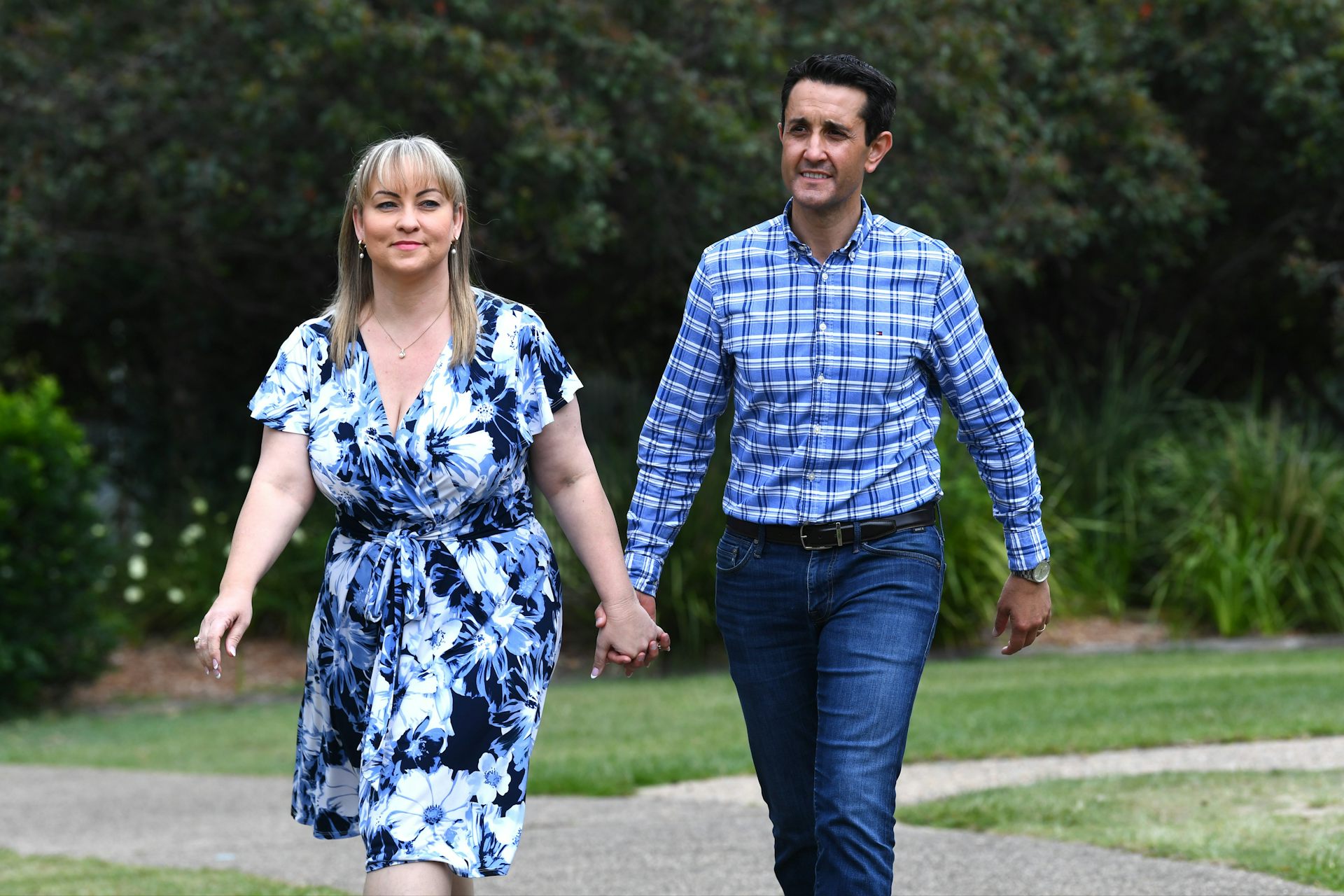
With 45% of enrolled voters counted in today’s Queensland state election, The Poll Bludger’s results have the Liberal National Party (LNP) winning 38 of the 93 seats, Labor 26, Katter’s Australian Party (KAP) three and independents one.
Including undecided seats where one party is ahead, it’s 49 LNP, 39 Labor, three KAP, one Green and one independent. A majority is achieved with 47 seats, so the LNP are on track for a majority.
The statewide two-party estimate is a 53.1–46.9 win to the LNP, a 6.3% swing to the LNP since the 2020 election. Current primary votes are 40.9% LNP (up 5.7%), 33.4% Labor (down 6.6%), 10.3% Greens (up 0.7%), 7.8% One Nation (up 1.0%) and 2.3% KAP (down 0.3%).
As pre-poll and postal votes have come in, the swing to the LNP has increased as these votes have had stronger swings to the LNP than election day votes. There are many more pre-poll and postals still to be counted, so it’s more likely that the LNP will exceed its current projections than fall below them.
I believe the Resolve poll that gave the LNP a 53–47 lead will be the most accurate. While Labor recovered from landslide defeat margins in polls taken about the middle of this year, it wasn’t enough. The uComms poll that gave the LNP just a 51–49 lead two days before the election was poor.
The Greens lost South Brisbane to Labor, after the LNP recommended preferences to Labor on their how-to-vote material after recommending preferences to the Greens in 2020. Analyst Kevin Bonham said this is the first time the Greens have lost a single-member seat that they won at the previous general election.
The key reasons for Labor’s defeat were an “it’s time” factor, as Labor has governed since winning the January 2015 election, the federal Labor government tending to hurt state Labor parties, and Queensland easily being the most pro-Coalition state at the 2022 federal election.
At that election, Queensland was the only state where the Coalition won the two-party vote (by 54.1–45.9). The second best state for the Coalition was New South Wales, where Labor won the two-party vote by 51.4–48.6.
Labor’s defeat in Queensland will give some assistance to federal Labor. An unpopular and old Queensland Labor government would have hindered federal Labor’s prospects in Queensland at the federal election that is due by May 2025.
Late polls
The Newspoll and uComms poll were both released after Wednesday’s preview article on the Queensland election.
A Newspoll, conducted October 18–24 from a sample of 1,151, had given the LNP a 52.5–57.5 lead, a 2.5-point gain for Labor since a mid-September Newspoll. Primary votes were 42% LNP (steady), 33% Labor (up three), 11% Greens (down one), 8% One Nation (steady) and 6% for all Others (down two).
Labor premier Steven Miles gained seven points for a -3 net approval, with 48% dissatisfied and 45% satisfied. LNP leader David Crisafulli’s net approval plunged 15 points to -3. Miles led Crisafulli by 45–42 as better premier, a reversal from a 46–39 Crisafulli lead in September.
A uComms poll that was conducted Thursday from a sample of 3,651 using robopolling, gave the LNP a 51–49 lead. Bonham had primary votes from this poll, which was not commissioned by anyone. The primary votes were 39.3% LNP, 33.6% Labor, 12.9% Greens, 7.8% One Nation, 2.9% KAP and 3.5% others.
Federal Essential poll: Labor slumps and Dutton’s ratings jump
A national Essential poll, conducted October 16–20 from a sample of 1,140, gave the Coalition a 48–46 lead including undecided (49–47 to Labor in early October). Primary votes were 35% Coalition (up one), 28% Labor (down four), 12% Greens (steady), 7% One Nation (down one), 2% UAP (up one), 9% for all Others (steady) and 6% undecided (up one).
Anthony Albanese’s net approval improved one point from September to -4, with 48% disapproving and 44% approving. He has improved six points since August. Peter Dutton’s net approval jumped six points to +6, his best in any poll this term.
King Charles had a 50–26 approval rating. By 45–39, voters supported Australia becoming a republic (42–35 in January). On Australia’s colonial history, 26% thought it something we should be proud of, 12% something we should be ashamed of and 62% said it had both positive and negative elements.
On the National Anti-Corruption Commission, 46% thought it is largely operating as intended but could be improved, 14% wanted it abolished and 10% said it’s successful.
Freshwater poll: Coalition holds narrow lead
A national Freshwater poll for The Financial Review, conducted October 18–20 from a sample of 1,034, gave the Coalition a 51–49 lead, a one-point gain for Labor since the September Freshwater poll. Primary votes were 41% Coalition (down one), 30% Labor (steady), 13% Greens (steady) and 16% for all Others.
Albanese’s net approval was up one point to -14, with 49% unfavourable and 35% favourable. Dutton’s net approval improved two points to -2. Albanese was just ahead as preferred PM by 44–43 (45–41 in September).
Asked about Albanese buying a $4.3 million house, 52% said it had no impact on their view of him, 36% said it had worsened their view and 4% improved their view.
Cost of living remained the top issue with 72% saying it was important. The Coalition retained a 14-point lead over Labor on this issue and a 16-point lead on managing the economy.
Morgan poll: Labor jumps ahead
A national Morgan poll, conducted October 14–20 from a sample of 1,687, gave Labor a 52–48 lead, a two-point gain for Labor since the October 7–13 Morgan poll.
Primary votes were 36.5% Coalition (down one), 32% Labor (up two), 13.5% Greens (down 0.5), 5.5% One Nation (down 0.5), 9% independents (steady) and 3.5% others (steady).
The headline figure uses respondent preferences. By 2022 election preference flows, Labor led by 53–47, a two-point gain for Labor.

